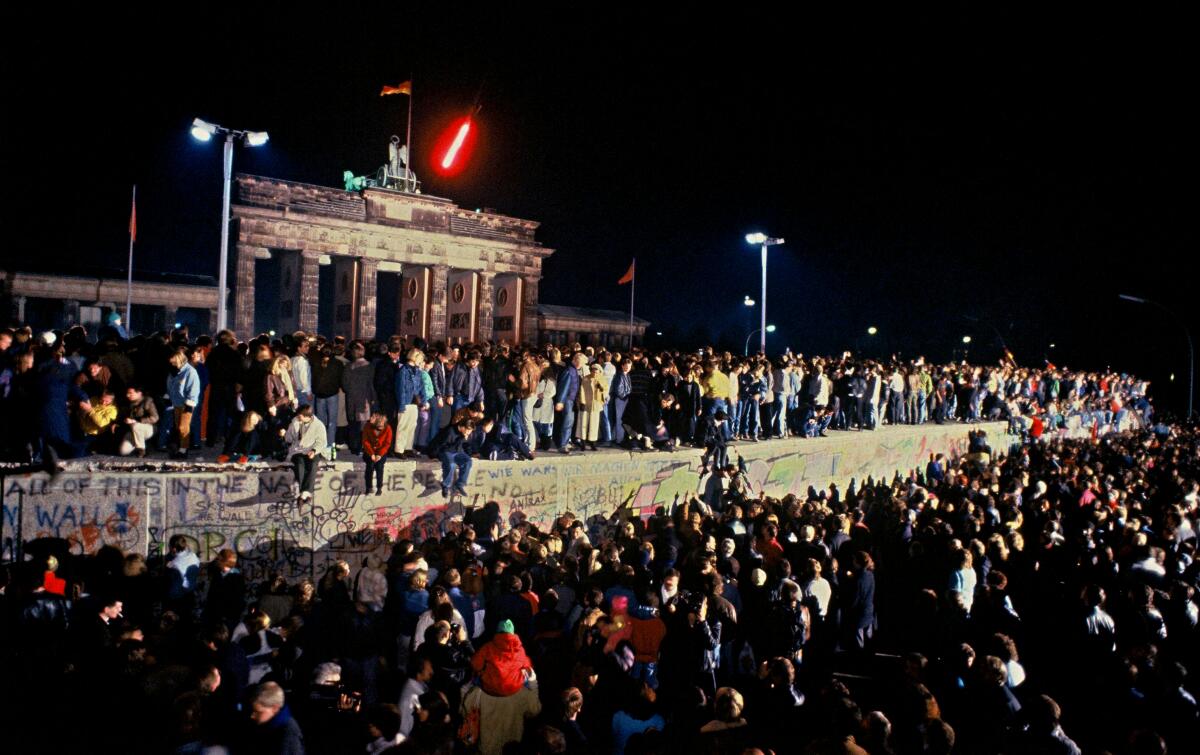The Berlin Wall fell and the U.S. learned the wrong lessons. It got us Donald Trump

- Share via
Thirty years ago, the fall of the Berlin Wall signaled the end of the Cold War. Where there had been two superpowers locked in a dangerous decades-long post-World War II rivalry, only one remained. A global order commonly but misleadingly referred to as bipolar gave way to a new era even more misleadingly referred to as unipolar.
The onset of this unipolar order induced in Washington a mood of sheer giddiness. Leading members of the foreign policy establishment persuaded themselves that a period of unprecedented promise now beckoned, with not only the United States but the world at large sure to benefit. The way ahead seemed clear. All that was needed to ensure the fulfillment of these happy expectations was for America to demonstrate the requisite level of leadership.
After all, leadership had enabled the United States to prevail in the Cold War. Through more of the same, the U.S. would now reap the benefits of victory for itself and for others. After all, who was there to say nay? Who would dare challenge the aims and aspirations of the world’s “indispensable nation”?
As for what requisite American leadership meant, the answer was more of the same: The United States should perpetuate the commitments, priorities, habits and especially the military posture that had evolved since 1945. The fundamentals of U.S. national security policy — our role as global policeman — would remain unchanged
Three decades into this era of ostensible American primacy, we are in a position to assess what it has yielded. The results, to put it mildly, have been disappointing. Expectations for what President George H.W. Bush once confidently described as a “new world order” remain unfulfilled. Indeed, to reflect on the era’s defining characteristics — the emergence of China as a great power, Europe’s long fade into geopolitical irrelevance, much of the greater Middle East succumbing to violence and instability, and a too little, too late response to climate change — is to realize that the American model of global leadership has tended to be either irrelevant or counterproductive.
How to account for the yawning gap between expectations and outcomes? One preliminary answer is surely this: Having fundamentally misunderstood the nature of Cold War itself, the United States therefore misconstrued the implications of its abrupt termination in 1989.
Few things are more dangerous than believing your own propaganda. Yet this describes the fate that befell the American establishment during the interval between the late 1940s and the end of the 1980s. A mythic Cold War, the handiwork of hysterical or cynical political, intellectual and media elites, supplanted the real thing.
The actual stakes of the actual Cold War were not insignificant: Ensuring that the badly weakened democracies of Western Europe did not slip into the orbit of Josef Stalin’s Soviet Union was both necessary and important. Yet the supposed stakes of the mythic Cold War were orders of magnitude greater. That Cold War pitted West versus East, us versus them, freedom versus slavery, liberal democracy versus communist totalitarianism, the God-fearing versus the godless, in sum, all that was good against all that was evil.
This was the Cold War to which President Kennedy referred when he memorably summoned his countrymen to “pay any price, bear any burden, meet any hardship, support any friend, oppose any foe, in order to assure the survival and the success of liberty.” It was, in short, policy and politics decoupled from reason, with disasters and near disasters such as the Bay of Pigs, the Cuban Missile Crisis, and Vietnam soon to follow.
Given the imagined stakes, when the Cold War did finally end on terms favorable to the United States, Kennedy’s political, intellectual and media offspring were quick to see in the outcome the hand of God, providence or history. In their preferred reading, the fall of the Berlin Wall in 1989 had rendered a conclusive and irreversible verdict destined to shape the future, with the United States of America empowered to do the shaping. This led, once more, to politics decoupled from reason.
We live today with the consequences of this decoupling: the World Trade Center attacks on 9/11, multiple wars that beg comparison with Vietnam in their folly, and, however obliquely, the bizarre presidency of Donald Trump.
You won’t hear it from any of the candidates vying to succeed Trump, but we are still haunted by our false conception of the Cold War. On the stump, politicians get away with reciting comforting clichés about the imperative of American global leadership. Yet the time for believing such malarkey is long gone.
An essential first step toward recoupling national security policy and reason is to see the Cold War for what it was: not a “long, twilight struggle” ending in victory, but a vast and costly tragedy that inflicted needless suffering, brought humankind absurdly close to extinction, and from which U.S. policymakers have drawn all the wrong lessons.
The anniversary of the fall of the Berlin wall offers an occasion not for celebration but for somber and long overdue reflection.
Andrew Bacevich, a contributing writer to Opinion, is president of the Quincy Institute for Responsible Statecraft. His latest book, “The Age of Illusions: How America Squandered its Cold War Victory,” is due out January.
More to Read
A cure for the common opinion
Get thought-provoking perspectives with our weekly newsletter.
You may occasionally receive promotional content from the Los Angeles Times.









